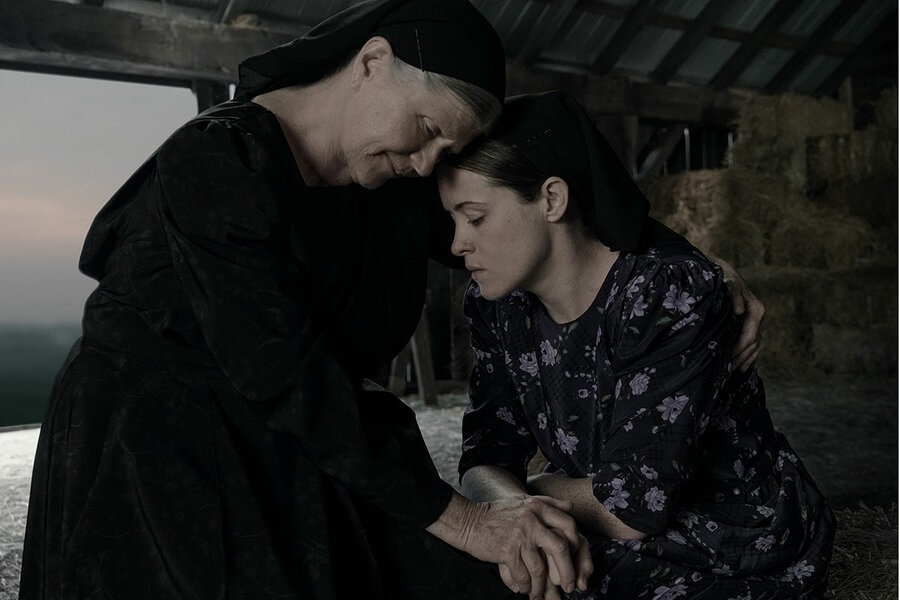Filmmaker: ‘Women Talking’ offers model of ‘truly democratic’ conversation
Loading...
| BOSTON
“Women Talking,” a movie with book-club appeal, is an adaptation of Miriam Toews’ novel of the same name. Loosely based on a true story, and centered on themes of forgiveness and courage, the film focuses on a group of women in an isolated Mennonite community as they face down the horrors of systematic drugging and rape by fellow parishioners, and work to build consensus on how to move forward. Writer-director Sarah Polley (“Away From Her,” “Stories We Tell”) sat down with the Monitor in Boston recently to talk about the film. The conversation has been lightly edited and condensed for space.
The costumes and set could imply a time long ago – that we’ve moved beyond harmful situations brought on by rigid gender roles – but it’s also timeless. Why is it important to tell this story now?
I think of the film as a kind of fable that’s about all of us who live in patriarchal societies. It grapples with the question of what we want to build, not only what we want to destroy, what we want the world to look like, not just what we don’t want it to look like.
Why We Wrote This
A story focused onIn “Women Talking,” Mennonite women plot a path forward after sexual assault. Writer-director Sarah Polley looks at the limits of forgiveness and the sacrifices of courage.
In the film there are moments of emotional tension, and then the women would gather and shift into their faith and the tension would dissipate. What was happening?
They have this amazing stuff to rely on, right? Like that amazing piece of Scripture that I think is so powerful and really changes the entire direction of the conversation. When one of the elders says, “I suggest that we think about what is good, what is pure, what is true, what is excellent,” and takes that verse from Philippians [4:8] and it completely shifts the conversation. It’s interesting because it’s a group of women who are illiterate, but what they do have is this unbelievable in-depth understanding and analysis of the Bible. ... [And then they] construct this truly democratic conversation that actually looks like what we should all expect from democracy, which is a fruitful, rich, difficult, evolving conversation.
In the film, each character has a different definition of forgiveness. Was that intentional?
Yes. Forgiveness is really tricky. I don’t think it can be impelled or something people can be pressured to arrive at. If harm is ongoing and present, it’s unreasonable to ask people to have forgiveness. ... What would you need to do to be able to forgive? Many times, the answer to that is boundaries and self-care, and doing what is good for you and your community as opposed to a self-sacrificing act. Creating the conditions for forgiveness to be possible involves a move towards right relations, and a sense of justice and a sense of safety, and a sense of freedom. And all of those things may one day lead to forgiveness.
How does the script honor the traditions of the Mennonite faith while also allowing the characters to reinvent themselves?
I think it’s really easy for secular audiences to sit back and judge a community that has faith ... and certainly the story we’re telling in this community ... is really horrific. So I was really interested in capturing tonally – through music, through image, through sound – what does it feel like to have faith? What are they fighting for? What are they hoping for?
In the writing of the script, when did hope emerge as an essential part of the story?
I just think it’s important to leave people with something. ... There’s something so hopeful in that they do find a way through.
With a female director, mostly female cast, and a script from a book by a woman about women, what do you want men to take away from the film?
It’s about the human experience. I wouldn’t shy away from the fact that it’s a feminist film. I think a lot of harm comes from hierarchical power structures and patriarchy, and some of that harm also falls on men. ... In fact, at the very heart of the film is the most sympathetic male character ever. ... Will men go see a movie called “Women Talking”? I can’t wait to find out. I certainly hope so.
What message do you wish to leave with audiences about how to imagine and build a better world?
All of the really hard things that have happened to us have also given us a greater capacity for empathy and for connection and community building. ... I think creating the conditions to be safe and free has to be so central to any kind of vision of the world. But for me, the thing that I really took away from this process of making the film is this capacity – which I don’t think I had before – to make as much room for imagining what I wanted the world to look like as analyzing what was wrong with it. And that, for me, just felt like a huge turning point in terms of possibility.
“Women Talking” opens in select theaters Dec. 23. It is rated PG-13 for mature thematic content including sexual assault, bloody images, and some strong language.







